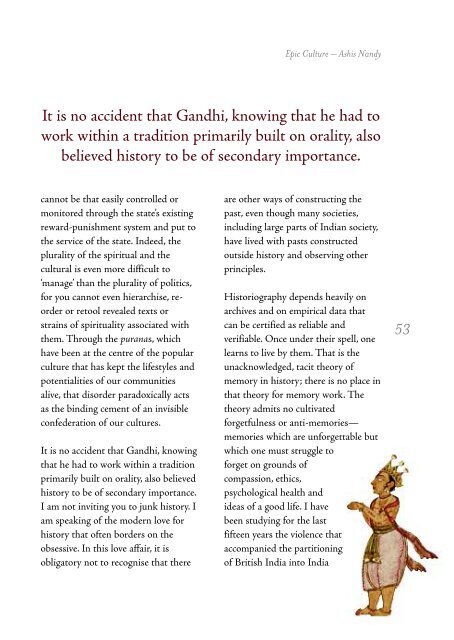Layout 3 - India Foundation for the Arts - IFA
Layout 3 - India Foundation for the Arts - IFA
Layout 3 - India Foundation for the Arts - IFA
You also want an ePaper? Increase the reach of your titles
YUMPU automatically turns print PDFs into web optimized ePapers that Google loves.
Epic Culture – Ashis Nandy<br />
It is no accident that Gandhi, knowing that he had to<br />
work within a tradition primarily built on orality, also<br />
believed history to be of secondary importance.<br />
cannot be that easily controlled or<br />
monitored through <strong>the</strong> state’s existing<br />
reward-punishment system and put to<br />
<strong>the</strong> service of <strong>the</strong> state. Indeed, <strong>the</strong><br />
plurality of <strong>the</strong> spiritual and <strong>the</strong><br />
cultural is even more difficult to<br />
‘manage’ than <strong>the</strong> plurality of politics,<br />
<strong>for</strong> you cannot even hierarchise, reorder<br />
or retool revealed texts or<br />
strains of spirituality associated with<br />
<strong>the</strong>m. Through <strong>the</strong> puranas, which<br />
have been at <strong>the</strong> centre of <strong>the</strong> popular<br />
culture that has kept <strong>the</strong> lifestyles and<br />
potentialities of our communities<br />
alive, that disorder paradoxically acts<br />
as <strong>the</strong> binding cement of an invisible<br />
confederation of our cultures.<br />
It is no accident that Gandhi, knowing<br />
that he had to work within a tradition<br />
primarily built on orality, also believed<br />
history to be of secondary importance.<br />
I am not inviting you to junk history. I<br />
am speaking of <strong>the</strong> modern love <strong>for</strong><br />
history that often borders on <strong>the</strong><br />
obsessive. In this love affair, it is<br />
obligatory not to recognise that <strong>the</strong>re<br />
are o<strong>the</strong>r ways of constructing <strong>the</strong><br />
past, even though many societies,<br />
including large parts of <strong>India</strong>n society,<br />
have lived with pasts constructed<br />
outside history and observing o<strong>the</strong>r<br />
principles.<br />
Historiography depends heavily on<br />
archives and on empirical data that<br />
can be certified as reliable and<br />
verifiable. Once under <strong>the</strong>ir spell, one<br />
learns to live by <strong>the</strong>m. That is <strong>the</strong><br />
unacknowledged, tacit <strong>the</strong>ory of<br />
memory in history; <strong>the</strong>re is no place in<br />
that <strong>the</strong>ory <strong>for</strong> memory work. The<br />
<strong>the</strong>ory admits no cultivated<br />
<strong>for</strong>getfulness or anti-memories—<br />
memories which are un<strong>for</strong>gettable but<br />
which one must struggle to<br />
<strong>for</strong>get on grounds of<br />
compassion, ethics,<br />
psychological health and<br />
ideas of a good life. I have<br />
been studying <strong>for</strong> <strong>the</strong> last<br />
fifteen years <strong>the</strong> violence that<br />
accompanied <strong>the</strong> partitioning<br />
of British <strong>India</strong> into <strong>India</strong><br />
53


